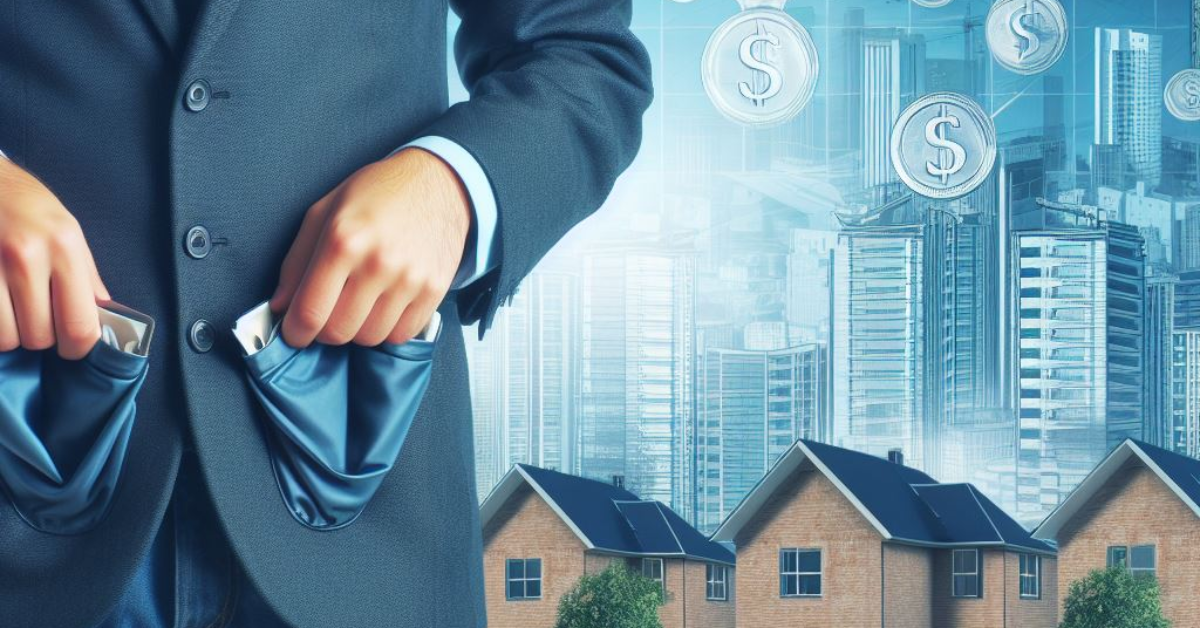Update Dec 14, 2024: Added Newsletter Email Archive at End of Post.
Private investment funds. That is the topic of todays discussion. You may have heard of something called a REIT or Real Estate Investment Trust, often these can be public companies who might raise money using capital markets. The goal of a REIT, like a normal “company” is to provide it’s investors a return on their investment, specifically through Real Estate. Frequently, the reason that people invest in Real Estate is due to tax benefits, and REITs tend to benefit from tax benefits as well. However, you don’t necessary have to invest in a public REIT, if you know the right people (*cough cough, call/email me), you can find private companies, some of them quite sizeable with hundreds of millions or billions of dollars in assets under management who operate like a REIT.
The benefits of investing privately rather than on the open market is that it is less costly to operate privately than it is to operate on the open market. The open market has very stringent accounting and financial reporting regulations which becomes costly. But, just because a private company doesn’t have these regulations doesn’t mean they are a bad investment or that they aren’t regulated at all. Many private companies, especially those that are sourcing funds from large numbers of investors, will create internal reports similar to what you would get on the open market, maybe monthly, maybe quarterly, as well as your usual MD&A (Management Discussion and Analysis) discussing what their plans are and how they plan to invest going forward. There is also governmental oversight, and securities regulators that get involved when a company is sourcing funds from investors, so generally they are quite safe to invest in and can provide better returns than open market REITs.
Usually these privately run REITs will have a variety of offerings. The one that I’ve connected with in the past offers a minimum initial investment as low at $5,000, and this “segment” of their business exclusively invests in large multifamily rental apartments. They aim to purchase well, fix up, and create a consistent cash flow as a dividend to investors and have a track record to back it up. They also have another division which focuses on development projects, think new construction condos. But the minimum investment for this is closer to $25,000 and you do not get your money back until the project is fully completed. But the total returns on these projects can sometimes be a doubling of your initial investment. You are effectively a source of funding for a well managed construction company and once the properties all get sold you get a payout. The downside is your cash can be locked up for extended periods of time, but it’s almost as passive as real estate investing gets.
Now you might be wondering, well how do the people who run all this stuff get paid? The answer is that there is a management fee baked into the return that you get back. This management fee depends on the type of project, the sector of real estate in which you are investing and various other things. But this is really where smaller, (i.e. Less than a billion dollar) companies tend to shine. They tend to run leaner operations than public companies and can choose to undergo things like development projects that take multiple years without the investors being able to pull out at any time when they fell like it. There are multiple other ways in which private real estate investing is superior to public REIT investing and I would highly recommend this route for people who want some exposure to real estate, but don’t want to manage it themselves and want to get good value for their investment.
There is no such thing as a guaranteed investment, but real estate is a tangible asset so you know your money is backing something that actually exists. The goal of many REITs is to provide cash flow, as mentioned above. Which means that the market fluctuations shouldn’t have a significant impact on the amount of money that you see, because the price of the real estate only matters when they go to sell it, and as long as they manage the properties well and continue to improve them and attract better rental prices, your investment will pay you dividends for years to come regardless of what the market is doing. Every investment has risk, but well managed real estate can be one of the lowest risk investments out there if you know where to look.
Now if you do have a higher amount of capital, you could do something like this yourself, or even if you just have a few hundred thousand dollars you may after some analysis that you can get better returns if you do it yourself. That’s fine if you have the time invest the money yourself, often if you’re making a high income, you may not time outside of earning that income to put the money you’ve made to use, and in that case this is a perfect win-win situation of you’re that type of person. You may not get as high of a return as doing it yourself, but it’s not a bad way to invest your money while you build up more capital to make your own moves.
Additionally, considering the real estate industry in Canada is so robust with high immigration rates, constrained supply, and interest rates that will (eventually) come back down. It’s a pretty good bet that going forward you will continue to make money in real estate. The only caution I’m going to throw in here is that there is now a concerted effort from all levels of government to get more homes built, which in years to come could slow down the appreciation we’ve seen in prior decades (you may only get 5% growth rather than 10% growth like we saw from 2010-2020). This I think overall will be a good thing as it will get more people into the homeownership market, and I know that myself and lots of other young people still would like to own a home some day so any relief in pricing will be appreciated.
That being said I also do think that a bigger issue is going to be rental prices. As more investors enter the market (which is the trend we are seeing). These investors will want rents to cover expenses and make continued cash flow. But valuations are so high, that from the POV of many investors rents just aren’t keeping up (high interest rates aren’t helping either). So investors either will have to become more creative, or they will have to pool more of their money together to purchase with less debt, since debt is so expensive right now, and this is again, where crowd sourced capital is a very neat idea.
In a way these high valuations and low rents make sense because there is this principle of highest and best use in real estate. The principle asks if a certain lot is being maximized and put to the “most profitable” use within the current laws. If the answer is no then your investment will look like a bad idea and rents won’t cover expenses. Often in order to achieve this highest and best use, you have to take on risk, do some redevelopment of a property (which has city council approval risk) or have private investors that will lend you their money at below market rates and expect a good ROI. Highest and best use can make it more challenging for individual investors in places like the downtown core since competition will continue to heat up for rental properties. The only people with the money to take on conversion projects might just be larger companies like the ones I mentioned earlier in this post.
If this sounds interesting to you and you just want to test out private investing, I encourage doing so with a small amount of money (as little at $5000), into a private REIT project, and then increasing your investment if you like the results. If you send me an email mentioning this blog post I’ll introduce you to the CEO of a company that operates out of Toronto and throughout the greater golden horseshoe area doing basically exactly what I described in this post, he’ll give you a much clearer and concise rundown of how they operate and what their strategy is. They are top notch and very professional and I would highly recommend them to anyone.
Hope you found this interesting.
Keep investing,
Oliver Foote
Newsletter #15: Investing in Real Estate With $5000. Summer is approaching.

This Weeks Blog Post:
Investing in Real Estate with Less Than $5000:
- I talk about what a REIT (Real Estate Investment Trust) is
- Why and when you should consider investing in one
- What the difference is between a private smaller REIT and a publicly traded larger REIT
Read the full blog post here: https://oliverfoote.ca/investing-in-real-estate-with-only-5000/
Real Estate News:
- CPI inflation fell as of the report this Wednesday from 2.9% in March to 2.7% in April (year over year changes). The largest driver of the slowdown in inflation was a slowdown in food prices increasing. Meanwhile gasoline (which impacts much of the other components of the index) increased 6.1% in April compared to 4.5% in March. Shelter costs remained high as well showing a year over year increase of 6.4%.
- While interest rates remain high, prices for homes have not moved considerably in either direction up or down. Even with more inventory coming onto the market than last year prices remain steady. Notably, lower priced homes have more inventory and fewer buyers, while higher priced homes are trading hands more often. This is an interesting dynamic and is keeping the average price steady, while individual micro markets are behaving quite differently depending on location, even within a few blocks of each other.
- The numbers tell one story, but in order to get a clear picture of what is really going on in the particular markets you are interested in a where the opportunities lie it requires some investigation. There are still many opportunities out there if you know where to look.
- I am going to continue to stress this in upcoming newsletters, but now is a good time to be an investor (even with the coming capital gains increase). Because you will be buying in a relatively cool market, and inflation is finally approaching 2% and is already within the BoC’s “margin of error” range of 1-3%. Once they cut rates, people will come back, and if you can get into the market before that happens, you will ride the wave of people returning to the market.
- Many people are predicting rate cuts towards the later half of this year, I’m inclined to believe the first rate cut will come after the summer and a second one in the winter for a total of 0.5%. We’ll see what ends up happening, since things tend to be taking longer than anyone expects.
Market Performance as of close Friday May 24, 2024:
S&P 500: 5,304.72 (+11.85% YTD)
NASDAQ: 16,920.80 (+14.59% YTD)
S&P/TSX Composite: 22,320.87 (+6.94% YTD)
Canada CPI Inflation Apr 2024: 2.7% (0.2% Decrease from Mar 2024)
Current BoC Benchmark Interest Rate: 5% NC (Next Meeting: June 5, 2024)
Unemployment Rate Apr 2024: 6.1% (0.0% Change from Mar 2023)
Have a great week,
Oliver
Subscribe to our newsletter!


